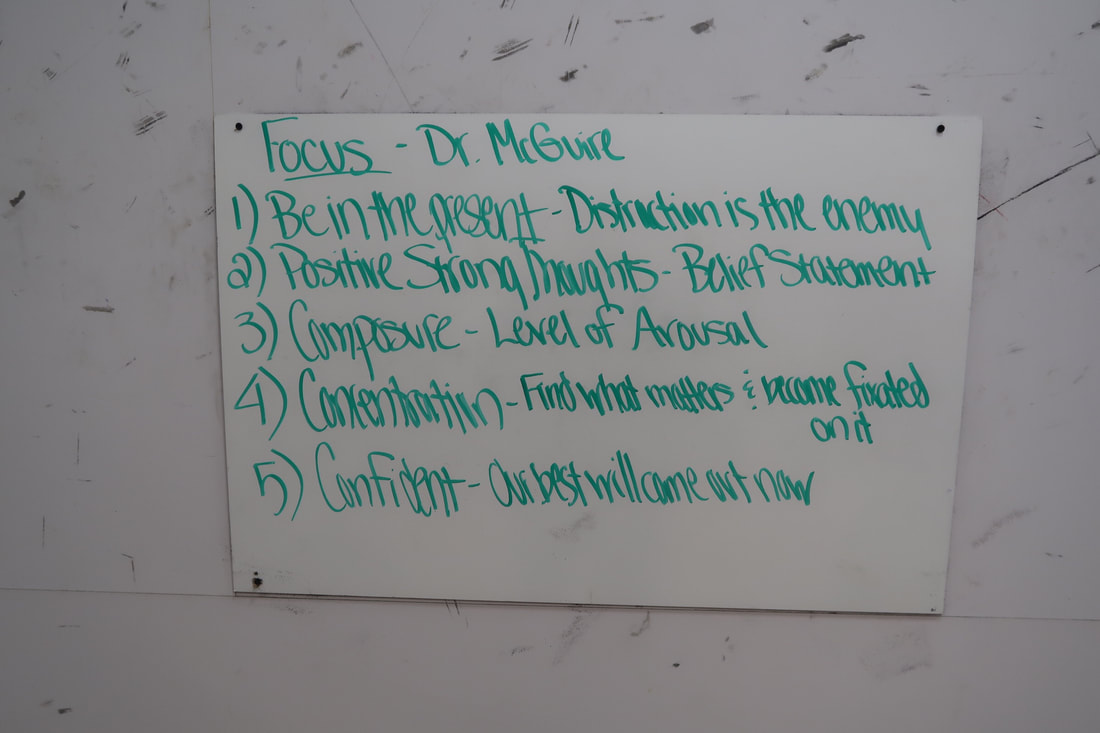|
I’ve attended my fair share of high school track and field meets over the past five years. While in attendance, something that has always struck me as odd is overhearing conversations between high school coach and athlete that sound something like this: High School Coach—“Focus on what you are doing. You can (insert technical tip here) better.” High School Athlete—(Looks at coach with a puzzled look) High School Coach—“Do you understand what I need you to do?” High School Athlete—(Still looks puzzled) Ok. Now, I’m embellishing a little bit, but if you are someone that has attended a sporting event, you’ve probably heard an adult (coach, parent, grandparent, etc.) say something to an athlete about the need for them to focus on what they are doing. To be honest, I’ve never had a coach tell me to focus on something. That can be for a couple of reasons. First, I wasn’t that important to what was going on in the game situation at the time that it was necessary to be told to focus. Second, I may have looked like I was focusing in on what I was doing. Third, my coaches just didn’t ever tell someone to focus. Maybe they just assumed that we were focusing on what we were supposed to be doing. In my track and field throwing career, I never had a coach tell me I needed to be more focused on what I was doing. Whether at practice, in the weight room, or in the middle of a competition, they never came over and had that conversation with me. Again, maybe I wasn’t that important to what was going on or they just didn’t tell their athletes to focus. I’m not quite sure. I’m also not quite sure if that was a good thing or bad thing. I’m writing about this topic today because a few months ago I listened to the best podcast episode of 2018, which emphasized focus, and how coaches can teach their athletes to focus on what they need to do. I’ve written about her in the past, but Dr. Amber Selking has one of the best podcasts available to anyone. She brings a wealth of knowledge and experience to her episodes about mental strength and mental conditioning. A few months ago she interviewed her mentor Dr. Rick McGuire, the godfather of mental strength and conditioning. In this interview, Dr. McGuire speaks about focus, breaks it down into five teachable tips, and goes into very specific detail about each tip and how coaches can teach their athletes to focus. You can clink the link below to listen to the complete interview between Dr. Selking and Dr. McGuire. The reason why I’m sharing this with everyone is because it is something I’m going to emphasize for myself in 2019. I’m going to spend diligent time practicing the skill of focus, and how I can better focus on what I need to accomplish during a particular day, week, month, and year. I’m also going to begin teaching the skill to the athletes I coach at the collegiate and high school level. I did begin working on the skill with one of my high school athletes the other day. I wrote the five parts of focus up on one of our whiteboards in our practice facility. I asked the athlete that I was coaching that day if anyone had ever spoke to him about it. He answered no. We spent about fifteen minutes discussing the five tips, what they mean, and how he can practice the skills at home, at practice, and in the weight room. I took a picture of the whiteboard, and sent it to him. I also sent him a text that included the link to Dr. Selking’s podcast link.
Since I started training for my upcoming powerlifting meet in March, I’ve spent a lot of time training in the garage with my two oldest boys. The commotion in the garage while attempting to squat, bench, and deadlift has been a bit overwhelming at times. However, I have begun implementing the training tips that Dr. McGuire and Dr. Selking discussed in their recent podcast. Just today I asked my five-year old to hold the camera while I attempted my squat top end set of 455lbs. (78% of my max) for 6 reps. It took a lot of patience and concentration to be in the moment while completing this set. I’ve been really emphasizing step one of being in the present moment when working out with my kids in the garage. Even though they are running around and playing, I’ve made it a point to remain in the moment, and work really hard to not think about what we just talked about five or ten seconds before I un-rack the weight until after I re-rack it. It has been a challenge working on the five steps of focus as an adult. I do wonder though how an elementary, middle school, or high school athlete feel/think when an adult tells them to focus on what they are doing, when in all likelihood the adult in the situation probably hadn't taught the athlete the skill to begin with. Here’s to a fun-filled, engaging, rewarding, and focused 2019! As always, thanks for reading ~ Charles
0 Comments
Leave a Reply. |
Dr. Charles InfurnaCharles Infurna, Ed.D., is the owner and lead coach of Forza Athletics Track Club. Dr. Infurna has coached National Record Holders, National Champions, All-Americans, and Conference Champions at the Post-Collegiate, Collegiate, and High School level. Archives
January 2023
Categories |


 RSS Feed
RSS Feed